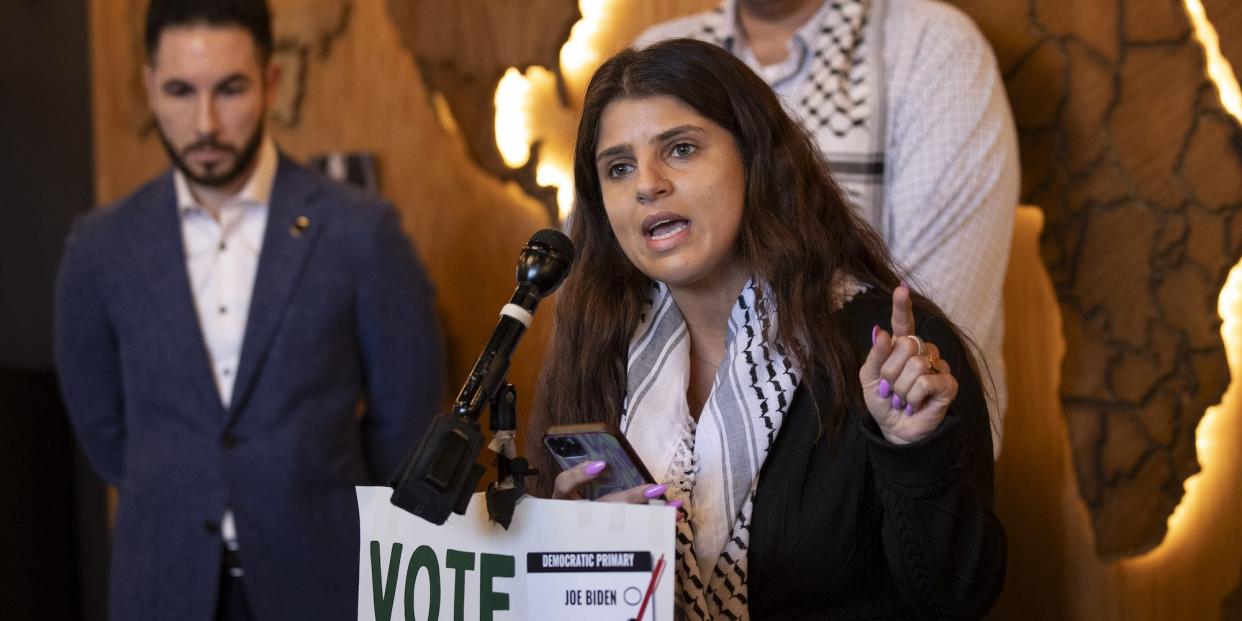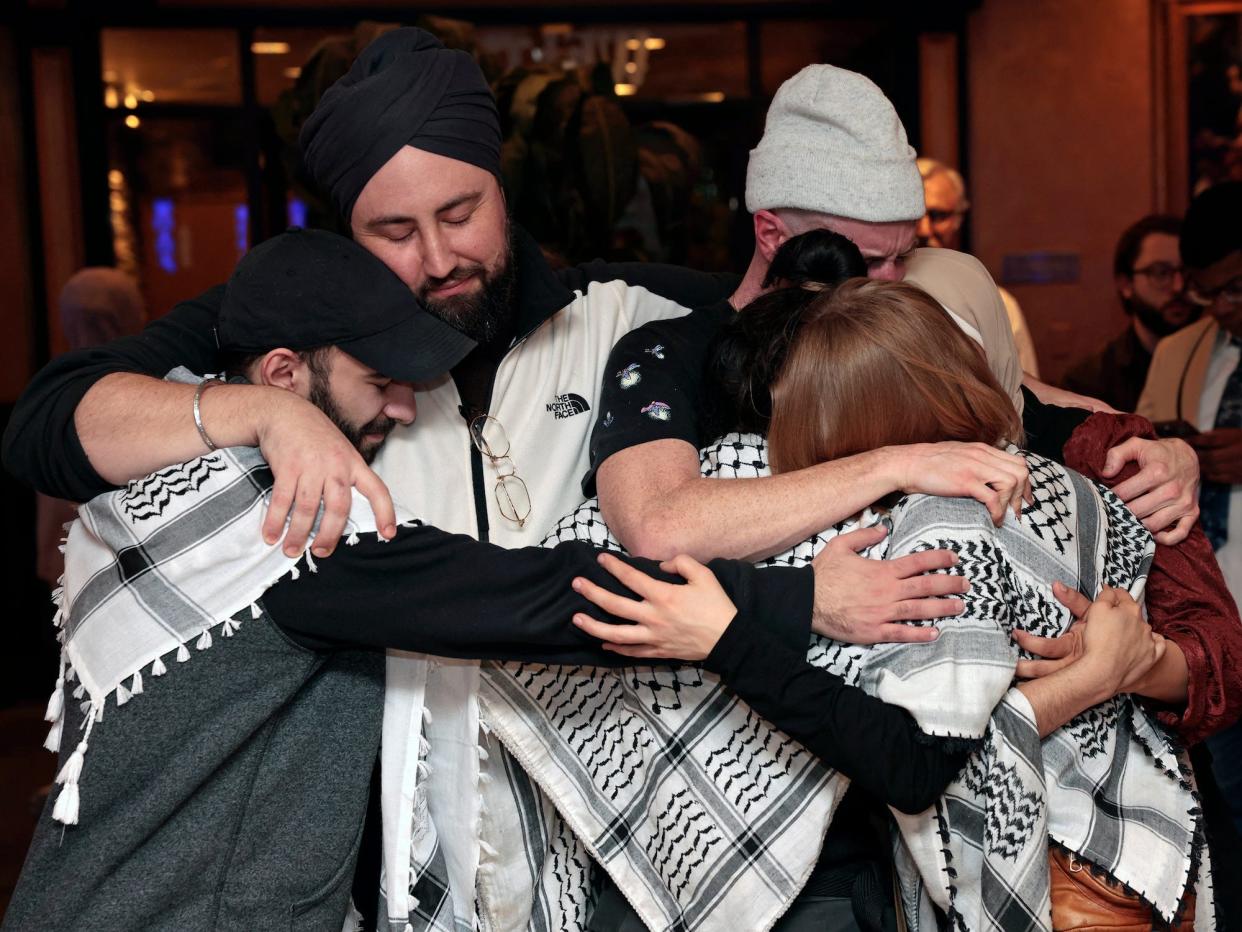'Uncommitted' Democrats may dump Biden over the war in Gaza. They say it's not their fault if Trump wins.

The Uncommitted movement is withholding support for Biden until he changes course on Israel.
They know who Trump is — but they're tired of being asked to vote for the lesser of two evils.
"It's time for Biden to move," said Abbas Alawieh, one of the movement's leaders.
Is it entirely the responsibility of a political candidate to win voters, or is it the responsibility of voters to choose the "lesser of two evils?"
That's the question shaping much of the conversation about the "uncommitted" movement, an ongoing campaign of Democratic voters who are — at least for now — refusing to vote for President Joe Biden this November in protest of his support for Israel's ongoing war in Gaza.
I posed this question to Lexis Zeidan, a 31-year-old Palestinian American activist and one of the leaders of the "Uncommitted National Movement," when I met her at a coffee shop in downtown Detroit last month. Her eyes lit up as she reached for her phone, where she pulled up an Instagram post she had seen earlier that day. "I think it'll answer your question," she said.
"'I will not be gaslit into voting for a man who I just watched proudly fund the murder of 30,000+ people. If this system requires us to choose between two genocide supporters, then humanity requires us to dismantle them both,'" said Zeidan, reading off of her phone. "'It's genocide. Do not tell me I am to blame because I didn't vote for your preferred war criminal. It's genocide. Genocide is as bad as it gets.'"
It had been just over two weeks since more than 101,000 Democratic voters cast "uncommitted" ballots in the state's Democratic primary on February 28, demonstrating that they could cost Biden the election in at least one state. That result was driven in large part by the work of organizers, including Zeidan, Layla Elabed, and Abbas Alawieh, who launched the "Listen to Michigan" campaign just weeks before the primary. Since then, tens of thousands of voters have cast uncommitted ballots in other states, the movement has begun coalescing under the banner of the "Uncommitted National Movement," and the burgeoning political bloc is set to be represented by at least two dozen delegates at this summer's Democratic National Convention.
The group has simple, albeit steep demands: a permanent, unconditional cease-fire in Gaza, an end to US military aid to Israel, and the reinstatement of humanitarian aid and funding to the United Nations Relief and Works Agency (UNRWA).
Biden has yet to make substantial policy moves on Israel, and much of the response from more partisan Democrats has boiled down to the same rejoinder: What about Donald Trump?
After all, the former president catered to the country's hard-right government's interests for more than Biden has, and Arabs and Muslims — a leading constituency within the uncommitted movement — have long been a scapegoat for Trump's brand of politics. The former president has even made vague pledges to expand upon the so-called "Muslim ban" that he enacted during his first term. To that point, Biden campaign co-chair Mitch Landrieu exhorted uncommitted voters to "think about the choices and what the consequences are about electing somebody who wants to have a Muslim ban" in an interview the day after the Michigan primary.
For the leading voices in the uncommitted movement, that's missing the point — and it's insulting.
"We are very aware of who Trump is," said Dearborn Mayor Abdullah Hammoud, whose majority Arab-American city houses the largest Muslim population in the United States. "This idea of a 'lesser of two evils' is extremely difficult to swallow."
"I get these messages kind of constantly in my DMs, telling me 'Oh, now you're gonna get deported,'" said Elabed. "These are people that I'm supposed to share the same values with as a progressive Democrat?"
Uncommitted voters are not a monolith, and some of them — particularly those who take their cues from the more hardline "Abandon Biden" campaign — may indeed never vote for Biden this November, no matter what. But Uncommitted National Movement organizers say it's best to view their efforts as a kind of negotiation. If Biden moves toward their position, he may be able to win back their support.
"President Biden, time and again, demonstrates that he moves when the party moves on issue after issue," said Alawieh. "The center of the party has moved here. We registered that fact at the ballot box. Now it's time for Biden to move."
'Electoralizing' discontent toward Biden
It has long been clear that Israel's war in Gaza, launched after Hamas killed 1,200 Israelis in an attack on October 7, is not popular with Biden's base.
Since November, polling has shown most Democrats disapproving of Israel's conduct in the war, which has claimed the lives of at least 30,000 Palestinians so far. Polling has also shown that roughly half of Biden's 2020 supporters believe that the war amounts to a genocide. Yet that sentiment had yet to show up in any ballot box.
That changed with the Michigan primary. The "Listen to Michigan" campaign was originally conceived in a memo drafted by Waleed Shahid, a progressive strategist and former spokesman for the left-wing group Justice Democrats. That document envisioned the original uncommitted campaign in Michigan as a way to "electoralize discontent over Biden's support for Israel's brutal war in Gaza" and make Biden "afraid of losing Michigan in the general election."

Elabed, the younger sister of Rep. Rashida Tlaib, served as the group's campaign manager, while Zeidan and Alawieh — a former senior staffer to both Tlaib and Rep. Cori Bush of Missouri — served as spokespeople for the group. Michigan proved to be particularly fertile ground, given the large Arab American and Muslim-American majorities in Dearborn, Dearborn Heights, and Hamtramck. To hear organizers describe it, it was an exhilarating and energizing experience in an otherwise dark time.
"We gave people who are experiencing great pain — whether they are directly impacted themselves, or whether they are livestreaming a genocide on their phones and horrified by the idea that our US taxpayer funds are paying for it — something to vote for in a moment when President Biden is failing to do that," said Alawieh.
Voting "uncommitted" in an uncontested primary isn't a binding decision, which organizers and progressives who sympathize with the effort have been eager to point out. Elabed described the campaign as a "gift" to Biden and the Democratic Party, in the sense that it crystallized the nature of the problem for them.
Showing up and being counted was, on some level, the easy and straightforward part. Now, the movement is in a more vague place, with lingering uncertainties around how Biden will handle the matter in the coming months and what uncommitted voters will accept in exchange for their votes.
'A genocide outweighs all of this'
Most of the people I spoke with say they still don't know how they'll vote in November — and they're tired of being asked. The election is still seven months away, and they argue that the ball is firmly within Biden's court. Until he shifts, they remain uncommitted.
So how could someone leave their ballot blank in November, even if it means risking a second Trump term and all that entails? The answers varied, but each drove at a central point: The scope of what's happening in Gaza every day makes the normal lesser-of-two-evils calculations of a presidential election feel almost beside the point.
Mayor Hammoud, for example, is no disaffected lefty. He has described Biden as a "transformative" president on domestic policy, and he ticked off several of Biden's accomplishments that he believed had changed the country for the better as I spoke with him. But again, that's now beside the point for him.
"A genocide outweighs all of this. Aiding, abetting, defending, and supporting a genocide outweighs all that transformative legislation," said Hammoud. He went on to note that one Dearborn resident came forward at a November city council meeting and told officials that he had lost 80 relatives in Gaza since the war began.
"To that individual, there is no way they would ever walk into the ballot box come November and cast their vote for Biden. I think that understanding should be there," Hammoud said. "What is the value of the life of 80 of your family members? There is no dollar amount to that. There's no economic impact to that. There's no multiplier that gets added to that. That is something that can never come back."
Even for those whose families and friends haven't been directly affected, there's a deep sense of alienation, particularly within the Arab American community, many of whom strongly identify with the Palestinians who are now facing treacherous conditions in Gaza.
"I've just never felt more un-American than I do right now," said Zeidan. "It's just a really weird place to be."
James Zogby, the president of the Arab American Institute and a Democratic National Committeeman, has long counseled his progressive allies to support their party's presidential nominee, even if that person falls short of the ideal. But he says he can't bring himself to do it this year, particularly in front of Arab American audiences.
"It's not that I don't believe that Joe Biden is — as we used to say — on a bad day, better than Donald Trump on a good day," said Zogby. "It's that I have spent 50 years of my life organizing for Palestinian rights. I've spent 50 years of my life organizing to get the Arab American community to be respected. We're being dumped on, and Palestinians are suffering genocide. I can't go before a community in Dearborn, or in Chicago, or in Paterson, or anywhere else, and literally trash everything I've done with my life."
'Give us something to work with'
As Alawieh and Elabed sat before me in a coffee shop on Dearborn's Michigan Avenue last month, I asked what might happen if Biden doesn't fulfill all of the group's demands. The room was largely empty, owing to the daytime slumber that befalls the city during the month of Ramadan, but Alawieh was animated as he responded.
"There is an entire menu of things that President Biden could do to move in the direction of discontinuing the funding of the killing," he said. "There's plenty of things that he could do to move in the direction of conditioning military funding, of stopping the transfer of offensive weapons. There's so much you could do."
In recent weeks, Biden has made some shifts, though they are primarily rhetorical. He has described Israel's campaign in Gaza as being "over the top." He announced the establishment of a temporary port on the Gaza coast during the State of the Union. He has made clear that he opposes Prime Minister Benjamin Netanyahu's plans to invade the city of Rafah in southern Gaza, where hundreds of thousands of refugees have fled. Last week, the US abstained from voting on a UN Security Council resolution calling for an immediate ceasefire and the release of hostages, though the administration quickly sought to downplay the vote's significance. The administration has also been pushing for a six-week cease-fire, conditioned upon Hamas agreeing to release the remaining Israeli hostages.
All of that still does not amount to what uncommitted organizers describe as their "bare minimum" demand: calling for an immediate and permanent cease-fire in Gaza, regardless of what Hamas may do.
Biden has also continued to authorize new weapons transfers to Israel, and he recently signed government funding legislation that includes a one-year ban on US funding to UNRWA after employees of the organization were accused of participating in the October 7 attack.

Several people who I spoke with floated ideas for Biden that fall short of the uncommitted movement's state demands, but that might turn things around.
Alawieh suggested halting ongoing weapons transfers to Israel, or at least enforcing existing human rights laws that govern such transfers. Former Rep. Andy Levin, a progressive Jewish Democrat who served in Congress from 2019 to 2023, said Biden has been "so small and unimaginative" amid the war and floated the idea of a "historic summit" with Israelis, Palestinians, and neighboring countries to demonstrate a commitment toward resolving the conflict. Zogby said Biden should try to be "at least as good" as Ronald Reagan, who called Israel Prime Minister Menachem Begin in 1982 to demand a halt to Israel's shelling of Beirut.
"I've been pleading with them: 'Give us something to work with," said Zogby. "Give us a change in policy, enough that makes us able to make the case."
What uncommitted voters are ultimately looking for is a sense of seriousness and clarity that they feel has been lacking from Biden. In one infamous instance in February, Biden casually told reporters that a ceasefire could be coming while standing beside comedian Seth Meyers in a New York ice cream shop.
"We're happy to have all the discussions about what happens in November," said Alawieh. "But first, we need you to put your ice-cream cone down and get serious about a cease-fire."
Uncommitted movement organizers do not seem to be taking glee in embarrassing Biden. But given that his administration and campaign have done little outreach to them since the primary, there's a fear that their concerns are simply being ignored.
"My greatest fear is that in November, he's not going to be remembered as the president who saved American democracy in 2020 and passed these transformative pieces of legislation," said Hammoud. "But rather sacrificed American democracy for Benjamin Netanyahu and looking the other way when it came to a genocide."
Read the original article on Business Insider
